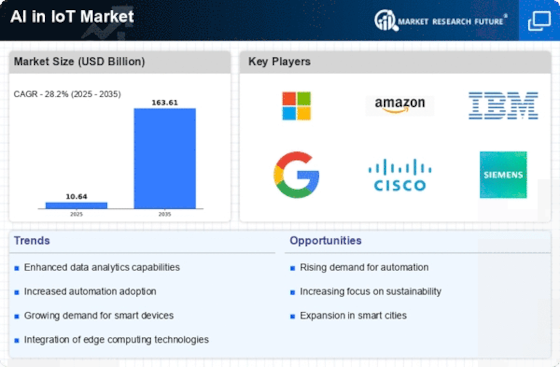Market Trends
Key Emerging Trends in the AI in IoT Market
In the constantly developing Internet of Things, the AI in IoT Market is growing quickly. Businesses wanting to dominate this convergence of AI and IoT technologies must have strong market share positioning strategies. As organizations utilize artificial intelligence (AI) to derive actionable insights from massive IoT datasets, strategic positioning becomes more critical for differentiation and success in a competitive market. AI integration into Internet of Things goods is a key market share strategy. Businesses with advanced machine learning algorithms, natural language processing, and predictive analytics in their Internet of Things solutions have a big advantage. These firms advance artificial intelligence. This strategic approach allows them to become industry leaders in providing sophisticated and intelligent solutions that can gather data from Internet of Things devices and derive useful insights for informed decision-making. Market share ambitions for artificial intelligence in the internet of things must also be customer-centric. Understanding the needs and challenges of firms in different industries helps them tailor their AI and IoT solutions. Matching products to customer needs makes businesses important partners in the adoption and deployment of AI-powered Internet of Things solutions, whether they're optimizing operational operations, energy efficiency, or predictive maintenance. Strategic relationships and cooperation inside a company can help market positioning. Artificial intelligence in Internet of Things businesses may build whole ecosystems by partnering with device makers, cloud service providers, and industry-specific solution providers. These alliances promote artificial intelligence and internet of things interoperability and market reach, enabling individual and group growth and innovation. Building a strong brand identity is another key to market share positioning in AI/IoT. Businesses that can communicate the value of their AI-powered Internet of Things solutions, show success stories, and become thought leaders in the convergence of AI and IoT technologies gain exposure and credibility. Companies seeking trustworthy partners for digital transformation are more likely to be interested in a strong brand presence since it depicts the company as a reliable and inventive market player. Customization and scalability are also important when launching an AI product or service in the IoT. AI solutions that can adapt to a broad range of Internet of Things use cases and scale with deployment volume and complexity provide companies an edge over their competition. A corporation may promote itself as a flexible and adaptable solution provider by supplying AI algorithms tailored to certain applications, industries, or business processes. Market share ambitions for artificial intelligence in the internet of things must handle data security and privacy. The more connected devices are, the more strict security precautions are needed. Complete solutions that secure sensitive data inside IoT ecosystems boost the market positioning of businesses that emphasize the incorporation of artificial intelligence (AI) into Internet of Things (IoT) solutions with integrated security features, encryption, and data protection standards. Pricing strategies and product cost-effectiveness can affect market share positioning. Finding a balance between AI capabilities and cost in IoT systems is crucial. Affordable pricing, transparent cost structures, and value-added packages attract various clientele. These clients include small enterprises exploring IoT adoption and large organizations seeking advanced artificial intelligence capabilities.


















Leave a Comment